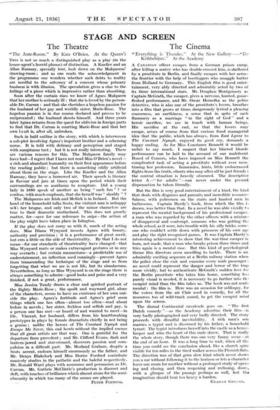The Cinema
" Everything is Thunder." At the New Gallery—"D Kribbebijter." At the Academy A CANADIAN officer escapes from a German prison camp. after killing a sentry who has double-crossed him, is sheltered by a prostitute in Berlin, and finally escapes with her acros the frontier with the help of bootleggers who smuggle butter from Holland to Germany. This English film is good enter- tainment, very ably directed and admirably acted by two of its three international stars. Mr. Douglass Montgomery as Captain McGrath, the escaper, gives a nervous, hunted, goose- fleshed performance, and Mr. Oscar Homolka as the police detective, who is also one of the prostitute's lovers, breathes into a film that grows at times dangerously lyrical a pleasing coarseness, an earthiness, a sense that in spite of such flummery as a marriage " in the sight of God " and a heroic sacrifice, we are in touch with human beings. His sacrifice at the end, so that the lovers may escape, arises of course from that curious fixed managerial idea that the public, which has always, from East Lynne to The Constant Nymph, enjoyed its good cry, demands a happy ending. As for Miss Constance Bennett it would be unfair to say much. I suspect that her blurred blonde performance can be laid to the account of our maleficent Board of Censors, who have imposed on Miss Bennett the complicated task of acting a prostitute without ever men- tioning her profession. Innuendos, hints, little embarrassed flights from the truth, clients who may after all be just friends : the central situation is heavily obscured. The descriptive letter A—" for adults "—can never under the present dispensation be taken literally.
But the film is very good entertainment of a kind, the kind that deals with disguises and pursuits and incredible resource- fulness, with policemen on the stairs and hunted men in bathrooms. Captain Hardy's book, from which the film i:4 drawn, was better than that. In a novel he was able vividly t') represent the mental background of his professional escaper. a man who was regarded by the other officers with a mixtur.! of disapproval and contempt, someone who was getting the whole school, as it were, into trouble with his silly tricks, some- one who couldn't settle down with prisoners of his own age and play the right recognised games. It was Captain Hardy's interesting achievement to show that the war-time escaper is born, not made, that a man who breaks prison three times and tries again is a mental case. But this kind of psychological theme film directors seem unwilling to tackle. There is an admirably exciting sequence at a Berlin railway station when the police close the exit and examine every male passenger : no novel could represent the danger and terror of the trap more vividly, but to authenticate McGrath's sudden love for the Berlin prostitute who takes him home, something les purely visual is needed, it is necessary to go further into th escapist mind than the film takes us. The book was not senti- mental : the film is. Here was an occasion for soliloquy, for the voices from the air Clair used in comedy, for all the resources too of wild-track sound, to get the escapist mind upon the screen.
The dismal Continental cavalcade goes on. " The first Dutch comedy "—so the Academy advertise their film—is very badly photographed and very badly directed. The story proceeds with dreadful inevitability. A rich man's son marries a typist and is disowned by his father, a household tyrant. The typist introduces herself into the castle as a house- keeper and wins the heart of this male shrew. That is really the whole story, though there was one very funny scene —at the end of an hour. It was a long time to wait, when all the time you could see the conclusion ahead, like a church spire visible for ten miles to the tired walker across the Flemish flats. The direction was of that grim slow kind which never shows you a car without following it to the horizon or lets a character leave one room for another without a prolonged study of open- ing and closing, and then reopening and reclosing, doors, with a glimpse of the passage perhaps as well, lest the imagination should bear too heavy a burden.
GRAHAM GREENE.






































 Previous page
Previous page